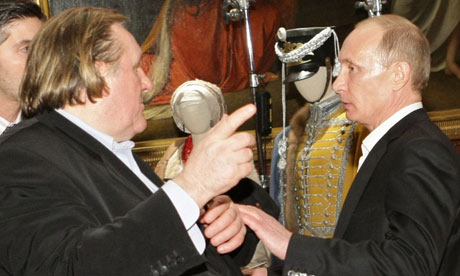
It was the sort of below-the-belt blow François Hollande could have done without. Still reeling from a series of political thumps at home and abroad, the French president received his first bloody nose of 2013 courtesy of a right hook from Russian leader Vladimir Putin on Thursday.
The Kremlin's announcement that Putin had signed official papers granting Russian citizenship to French national hero Gérard "Gégé" Depardieu hit home. It also turned what had seemed a somewhat comic hissy fit between the actor and his government into an international spat.
Hollande should have seen it coming. Ever since Depardieu, 64, entered the political ring to spar with his country's leadership over taxes weeks ago, this was a punch waiting to be landed.
Enraged at having his decision to leave France for fiscal exile in neighbouring Belgium described by French prime minister Jean-Marc Ayrault as "shabby", Depardieu, star of the Hollywood film Green Card, had turned bellicose, threatening to give up his French passport.
And there, given that France's civil code requires a citizen to have another nationality in order to relinquish being French, the melodrama might have ended, had Putin not joined the fray.
On Thursday Moscow praised the actor, saying Depardieu had earned his new passport for his contributions to Russian culture and cinema. Dmitry Peskov, Putin's press secretary, told the Interfax news agency that Depardieu's portrayal of Grigory Rasputin, notorious for the hypnotic power he wielded over Tsar Nicholas II's imperial family, in a new film was "daring and new".
Since Hollande, the self-anointed Monsieur Normal, took power in May last year his domestic popularity has plummeted. He struggled to rise above accusations that he is a political lightweight while blow upon blow fell: a credit agency downgrade, rising unemployment and spluttering growth, to name a few.
The French president's 75% supertax on annual earnings above €1m (£800,000) – a key election pledge – may have been primarily symbolic, but when France's highest court, the constitutional council, struck it down last weekend as unfair and unconstitutional – mostly because of sloppy drafting – Hollande was left facing damaging accusations of amateurism.
Abroad, other European notables have lined up to put in the boot. The German chancellor, Angela Merkel, made it clear that she disagrees with Hollande's claims that the euro crisis is over, and David Cameron, along with London mayor Boris Johnson, offered to roll out the red carpet to those seeking to pay less tax.
Depardieu aside, the billionaire Bernard Arnault, head of the luxury goods group Moët Hennessy Louis Vuitton, is seeking Belgian nationality. Alain Afflelou, the king of high-street opticians, has announced a move to London but denied he would be a tax exile. This week musician Jean Michel Jarre announced a possible London project but denied a move for tax reasons. Ligue 1, the French premier league, has breathed a sigh of relief that it can continue paying its stars multimillion-euro salaries without also having to settle their tax bills.
Putin's ill-timed announcement is not the first occasion he and Hollande have clashed. The pair squared up less than a month after the French president took power, over Syria. In a meeting at the Élysée in June described by the French press as "muscular", Hollande emerged, in the words of Le Figaro newspaper, "like a boxer, relieved and a bit groggy" after his encounter with "battling Putin".
French government spokesperson Najat Vallaud-Belkacem refused to comment on the Russian's gesture, saying it was "his exclusive prerogative". "It's a choice for the head of the Russian state," she said.
Kremlin officials suggested that Depardieu would be the first of many tax refugees to head for Russia, which has a flat income tax rate of 13%, and where the actor is perhaps best known for his starring role in Sovietski Bank advertisements.
"In the west they are not well acquainted with our tax system," deputy prime minister Dmitry Rogozin wrote on Twitter. "When they find out, we can expect a mass migration of rich Europeans into Russia."
During a press conference last month, Putin talked of his "warm personal relationship" with Depardieu and said the actor thought of himself as a "European and a citizen of the world".
Putin is not Depardieu's only high-profile friend. The actor is due to star in a film written by Gulnara Karimova, the daughter of authoritarian Uzbek leader Islam Karimov. And he is on first-name terms with Ramzan Kadyrov, the Moscow-backed ruler of Chechnya who is accused of widespread human rights abuses, including the torture and murder of political opponents.
Visting Chechnya during the strongman's birthday celebrations in October, video footage shows Depardieu shouting from a stage: "Glory to Chechnya! Glory to Kadyrov!"
Depardieu's nationality change – which the actor has yet to officially accept or confirm – was welcomed by Kadyrov. "It's good news," he wrote on Twitter, repeating an invitation for the star to come and live in Grozny, the Chechen capital flattened during two bloody separatist wars after the fall of the Soviet Union.
Soviet film director Stanislav Govorukhin, who ran Putin's presidential re-election campaign last year, was less impressed.
"He's just another drunkard," he said of Depardieu. "I don't like this sycophancy towards foreigners," he told the Russian News Service.

